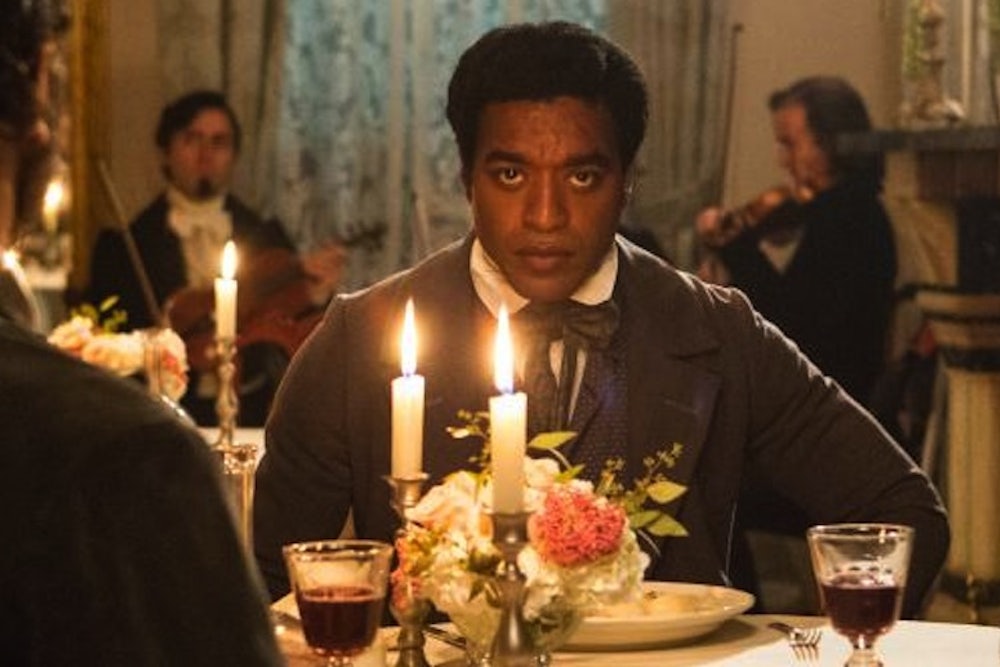Last week, I saw 12 Years a Slave and thought it was absolutely superb. For this reason, and because it concerns arguably the most important aspect of American history, I have been seeking out commentary about the film. What I have found instead is a bunch of hand-wringing about whether the movie should have even been made. (Warning: If you know nothing about the movie, there are some spoilers below.) In a blog post for The New Yorker that is (yes, really) titled, "Should a Film Try to Depict Slavery?," the magazine's smart film critic, Richard Brody, writes:
The question is whether the director Steve McQueen has trivialized or exploited Solomon Northup’s and other slaves’ sufferings by the very act of treating slavery as a collection of dramatic incidents no less ripe for naturalistic cinematic depiction than any novel or latter-day true-crime story.
The fact that Brody even thinks this is a question worth asking and answering is bizarre, especially for a film critic. I wasn't aware that a subject matter's seriousness could possibly make artistic representations inappropriate. Brody continues:
That’s why there’s a shadow movie just off-screen beside 12 Years a Slave, one that wouldn’t show the abduction, enslavement, and brutalization of Solomon Northup at all. Instead of treating the story of Solomon Northup’s abduction and enslavement as a naturalistic drama, the shadow movie would depict the very possibility of filming the story. It might involve the discovery, by Steve McQueen or a fictionalized stand-in for him, of Northup’s book.
That certainly sounds like a less interesting movie. To Brody's credit, however, he does go on to explain why the film is impressive. Still, he makes a number of odd digressions, such as this one, where he seems to argue that we treat the Holocaust more seriously than slavery. His evidence: word use.
Though the term “the Holocaust” is immediately identified with extermination, the term “slavery” is widely associated with involuntary servitude—with unremitting labor. When we say that we’re slaving away at our desk, it means we’re doing hard or dull work demanded by our bosses; it doesn’t imply physical violence or the threat of death—and that’s exactly what McQueen restores to the term and to the idea, in all of its horror and monstrosity.
I might as well argue that we don't take the Holocaust seriously because there is a famous episode of television titled 'The Soup Nazi.'
Similar problems afflict Peter Malamud Smith's piece in Slate, which contains some nervous commentary about why this particular slavery film was made, rather than another slavery film. Specifically, why did the filmmakers choose to tell the story of an educated black man who survived slavery rather than a more common narrative of an entire lifetime of bondage? Smith argues that the audience will only take a certain amount of violence and horror:
So perhaps it’d be fairer to say the limitation is not with 12 Years a Slave but with us as an audience. It’s just so hard for us to identify with “the regular slaves,” in whatever form they may take. 12 Years a Slave is constructed as a story of a man trying to return to his family, offering every viewer a way into empathizing with its protagonist.
It's interesting to wonder why this movie was made rather than another movie, and certainly Hollywood has certain things it likes and does not like. But this has nothing to do with the movie itself; instead, it is commentary on why the people involved decided to make this particular story. (I don't know all the reasons, and presumably neither does Smith). So we are stuck with observations like the following:
In our entertainment, there is only so much we can take. Is it even possible to make a movie that tells the absolute truth about slavery? That, Northup or no Northup, for two awful centuries of American history, the individual was not bigger than the institution? We can handle 12 Years a Slave. But don’t expect 60 Years a Slave any time soon. And 200 Years, Millions of Slaves? Forget about it.
A couple things: for starters, if Hollywood ever did make a movie called 200 Years, Millions of Slaves, how much would you wager that writers like Smith would be denouncing Hollywood for de-personalizing slavery? Doesn't Hollywood realize that actual individuals suffered? Doesn't Hollywood grasp that the evils of slavery went beyond statistics? Secondly, 200 Years, Millions of Slaves is not a movie. Movies focus on individuals or groups of individuals. How would one even conceive of Smith's project? Smith even seems to backhandedly acknowledge as much, writing, "Maybe we need a story framed on that individual scale in order to understand it." Maybe we do! In the meantime, we should evaluate 12 Years a Slave on its own terms.
